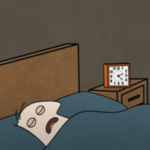
Do you ever feel like taking a nap?
Napping when done briefly is good for you, and a great way to supplement a night’s sleep.
Scientists have found that a brief 15-minute nap can reduce sleepiness and boost cognitive performance immediately and for a number of hours afterward.
Longer naps might make you feel impairmed for a short period, but still have the same net effect on cognitive performance as the day wears on.
Napping also leads to increased emotional control and tolerance for frustration, which can aid you in plowing through the remainder of your to do list.
While longer naps are good for you in that they increase long-wave sleep, and can even form new connections in the brain, they also have the downside of sleep inertia.
If you’re prone to waking up from a nap longer than 30 minutes feeling groggy for a while, take shorter naps.
Taking a nap after 6 hours of being away is a great way to maximize your circadian rhythm by napping when your cortisol is naturally low.
Cortisol
This stress hormone regulates wakefulness.
You’ll fall asleep easier as it’s dipping, and will sleep more soundly.
If it’s a power nap you’re after, try drinking a cup of coffee beforehand.
Caffeine competes with adenosine in your brain for receptor sites.
Adenosine is a byproduct of brain activity, and by sleeping for just 20 minutes your brain clears out the receptor sites naturally, leaving more open for caffeine to attach to.
This means you’re getting more bang for your buck!







